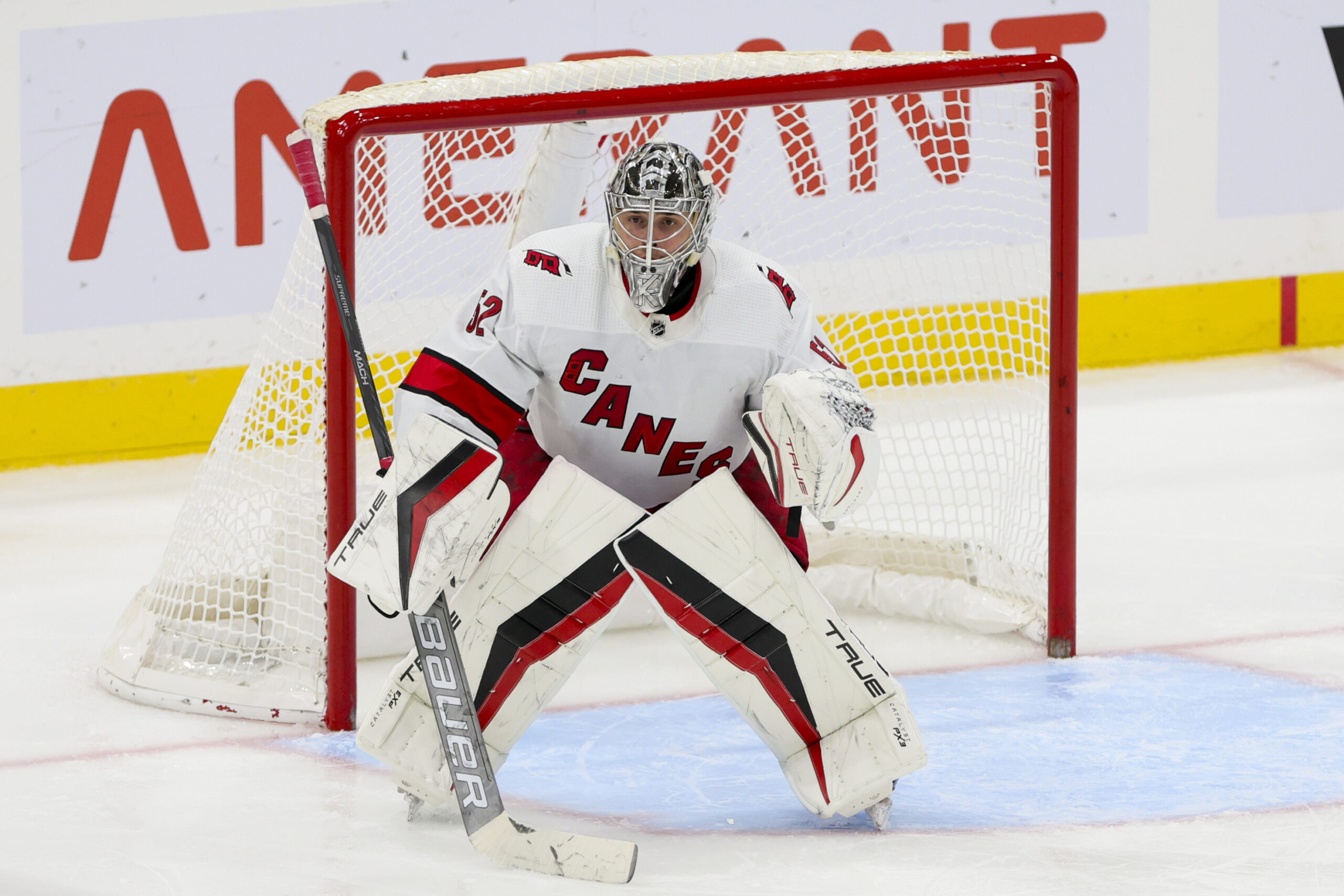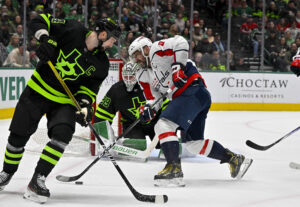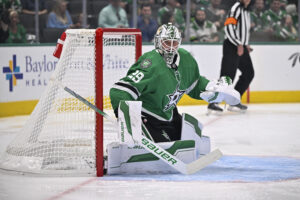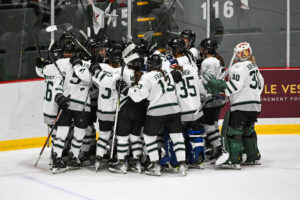The Carolina Hurricanes entered the 2023-24 season in an interesting position organizationally. Last year’s AHL affiliate of the Chicago Wolves decided to not re-affiliate with Carolina, instead opting to go independent. While it is not typical, there is no requirement for an NHL team to have an AHL affiliate. However, because there is no Hurricanes AHL affiliate, Carolina is in a tricky spot when it comes to depth and development.
Carolina Hurricanes AHL Affiliate Lacking
The Hurricanes had a good thing going with the Chicago Wolves of the AHL for a few years. The team won multiple AHL championships (one being a weird COVID year) and were utilizing a good mix of experienced AHLers and Hurricanes prospects. But last season, the Wolves struggled with a larger contingent of Hurricanes prospects in the fold. This supposedly led to some disagreement between the Wolves and Hurricanes management groups. Chicago wanted to be a more competitive AHL team while Carolina was more focused on developing its prospects. This likely led to the former Hurricanes AHL affiliate going on their own.
Without an AHL affiliate, the Hurricanes went to work on figuring out “workarounds.” Various European players made their way over to Finland and Russia such as Alexander Pashin, Ville Koivunen and Aleksi Heimosalmi. The more “NHL-ready” players such as Dylan Coghlan and Jamieson Rees were loaned to other AHL teams. Younger players such as Domenick Fensore, Ronan Seeley and Blake Murray made their way to the Norfolk Admirals in the ECHL. Interestingly, the Hurricanes also do not have an ECHL affiliate. They did however enter into a “working agreement” with Norfolk even though the Admirals are affiliated with the Winnipeg Jets. Other European players in Noel Gunler and Anttoni Honka were assigned to Norfolk but instead opted to go back to Europe. The other big news was promising goaltender Pyotr Kochetkov going to the Tampa Bay Lightning’s AHL affiliate Syracuse Crunch.
Not a Requirement, But an Almost Necessity
While the Hurricanes recognized figuring out a solution to this, they also did not seem overly concerned. There are no requirements for an NHL team to have an AHL affiliate. But with that said, the Hurricanes are the only NHL team without an AHL affiliate. It is certainly a route seldom taken.
The typical arrangement between an NHL and AHL team can come in one of two ways. One is that the NHL and AHL teams are independently owned and they enter into an “affiliation agreement” for a set amount of years. The other arrangement is for the NHL team’s ownership group to also own the AHL team. The second arrangement accounts for the ownership of 21 of 32 AHL teams.
There are many reasons why concurrent ownership takes the majority here. NHL teams want to have more control over the development of its younger players. Likewise, having concurrent ownership prevents a situation such as Carolina’s from happening. As the league progresses, we may see more and more of this arrangement. But it will take time as the currently independently owned AHL teams need to come up for sale.
A Place for Depth
One main reason to have an AHL affiliate is to have a place for depth players to stay fresh while waiting for NHL opportunities. Typically, an NHL team will sign forwards and defencemen on two-way deals with the objective of them spending time in the AHL, only to be called up due to an NHL injury. Having an AHL affiliate makes this a somewhat seamless process.
Without an AHL affiliate, the Hurricanes really don’t have any more “veteran” type players fitting this role this year. They have some younger players who went to the ECHL and a handful who were loaned to different AHL teams. So, even though Carolina has an extra forward and defenceman on its NHL roster, it will be interesting to see what happens when further injuries strike. Maybe the more “NHL-ready” prospects will make their NHL appearances. We may also see some “in-season” PTOs.
The Hurricanes had a large group of players on PTOs in training camp that all were released. Had there been an AHL affiliate, some of those PTOs may have stuck.
Prospect Development
The other big necessity for an AHL affiliate is for prospect development. The Hurricanes have a great prospect pool. But effective prospect development is just as if not more, essential for success as drafting players. Managing development involves many aspects. Having control over where the team’s prospects are developing is a big focus for NHL teams. As mentioned above, this is why the concurrent ownership can be beneficial.
When the NHL and AHL teams are separately owned, their goals may not entirely align. The AHL team may focus more on winning while the NHL team focuses on prospect development. Well, the Hurricanes have essentially little to no control when they not only operate independently of any AHL team but also don’t even have an affiliation agreement with a team.
As far as the specific leagues, some players may be playing below their level in the ECHL. Fensore for example could use an AHL season or two to test his ability and develop. Meanwhile, many European players may need a year or so in the AHL to adjust to the North American ice size and game. There’s less room on the ice and the game tends to be somewhat more physical in North America than in Europe.
However, it’s not entirely as drastic as it sounds. Some players will get experience on other AHL teams while others will develop in very competitive European leagues. But when a team invests in a whole department focused on player development, the more control the better.
Plans for a Future Hurricanes AHL Affiliate
While the Hurricanes may have to operate in a sort of wild west this year, it’s unlikely this arrangement (or lack thereof) will stick. It was reported that the Hurricanes are actively looking to purchase an AHL team and are willing to pay more than the price of the last AHL team sold. It was also reported that the Hurricanes asked the AHL Board of Governors to expand to 33 teams over the summer. Such request was denied. There are currently 32 AHL teams, and 32 NHL teams. Unless there was a joint arrangement, like the Florida Panthers and Seattle Kraken had with the AHL’s Charlotte Checkers during Seattle’s first year, this can make affiliating tricky. If one AHL team doesn’t want any NHL affiliation, it becomes like a game of musical chairs. And this year the Hurricanes were the ones left standing.
There are a lot of unknowns for Carolina. Both for this year and the further future. But Hurricanes owner Tom Dundon has no problem investing money into this team so don’t be surprised to see him purchase an AHL team. It was a great setup when the Hurricanes and Checkers were affiliated as they were both in North Carolina. But like the Wolves, there seemed to be differences in goals of the ownership groups even though proximity was perfect. As many fans have dreamed, could we see another North Carolina AHL team jump into the Hurricanes bus? Time will tell but the current arrangement certainly presents some challenges.
Main Photo Credit: Sam Navarro-USA TODAY Sports






